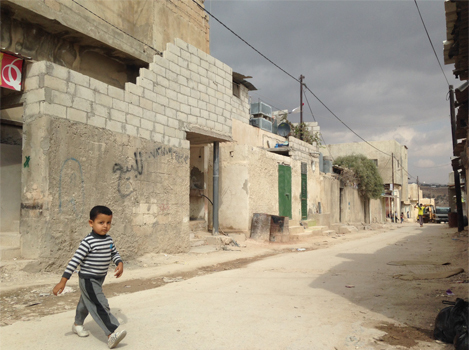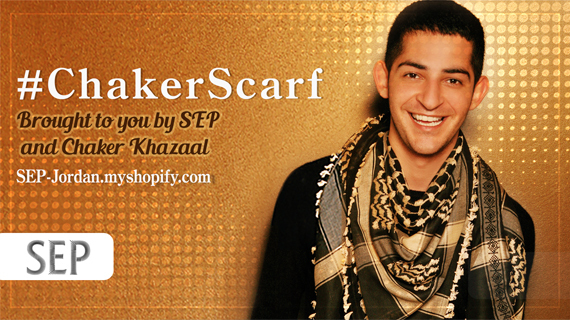Recalling childhood memories, one in particular stands out the most.
Our family lived in the Bourj el-Barajneh Refugee Camp (Arabic: برج البراجنة, "Tower of Towers") located in the southern suburb of Beirut in Lebanon. The International Federation of Red Cross and Red Crescent Societies established the camp in 1948 to accommodate the influx of Palestinian refugees from the Galilee in present-day northern Israel.
The United Nations Relief and Works Agency (UNRWA) originally envisaged up to 10,000 Palestinian refugees living in this one square kilometer (0.4 square miles) site. After 67 years of displacement, and the growing number of Syrian and other refugees fleeing to Lebanon, the camp's population tripled.
We were one of many multigenerational families living in this small compound. My strongest memories centre around my grandfather and the walks we took together. He would take my hand and tell me stories about his life in Palestine in the 1930's. I learned about the diaspora of Palestinians in 1948 from their original homeland to Lebanon and beyond -- a truly displaced nation.
My grandfather enjoyed repeating the well known tale about a group of "entrepreneurial" refugees who came up with the idea of reconstructing UNRWA donated tents to make sustainable cement dwellings with zinc ceilings. He told me that working together, building these "homes", gave him a sense of community and purpose. As an adult who grew up a refugee, I realize now that this feeling was a rare commodity under the circumstances.
Our walks had a purpose as we set our sights on the only berry tree growing at the opposite end of the camp. It wasn't too far away and I always ran the last few feet to beat my grandfather. Laughingly arriving at the tree, we shook it to get as much fruit as we could. My grandmother would bake the berries in cakes and make jam, the rest were treats for the family, especially the children.
During these outings we walked past long queues of men, women and children waiting for food and medicine donated by UNRWA and other Humanitarian Relief Organizations. Lining up for hours, often under punishing conditions, it was impossible for these refugees to mask their humiliation and despair. Accepting charity is an admirable trait but one that ultimately sits heavy on the heart, crushing the spirit. With sadness in his voice, my grandfather told me that we were prohibited from working.
Although change was critical, it was not until 2005 that "officially registered" Palestinian refugees born in Lebanon were allowed to work legally in basic clerical and administrative sectors only. Back to square one -- seasonal, low pay, no benefit work -- was the direction most taken.
I thought about those educated, and in some cases scholarship recipient refugees, who studied hard in their chosen career path. Unable to work in their graduated field of law, engineering, medicine or finance, I wondered what was to become of this disheartened generation. If you are not identifiable, how can you measure your success?
With such a critically unemployable, albeit educated "workforce", it became clear that future educational commitment would certainly falter. Disillusioned with the system, most young people drop out of school, supporting themselves and their family any way they can. Bearing witness to such a debilitating employment situation, Palestinian refugees have no choice but to remain highly dependent on the underfunded UNRWA.
As another generation of Palestinian refugees succumb to personal and academic dead ends, we must explore alternate options, with a view to leveraging our resources with 'like minded' business models. With the rapid growth of technology in the digital landscape, "remote" employment is a lucrative alternative. Advertised positions in medical billing and coding, textbook writing and editing, project management, fashion, web design or virtual instructors, present a vast array of options.
Palestinian refugees should have the right to study, work and take charge of their lives -- key instruments to grow confidence, determination and self-sufficiency. I felt that collaborations with business acumens standing by this conviction would be a windfall.
Roberta Ventura, founder of The Social Enterprise Project -- SEP -- shares such a belief. One of SEP's main objectives is to revive hope and passion in the remote Palestinian Refugee Camp of Jerash, through the art of craftsmanship.
Locally known as 'Gaza Camp', it was established in 1968 as an "emergency" site for 11,500 Palestinian refugees and displaced persons. I was told by Ms. Ventura that "today, there are no statistics of the camp's population, but we estimate it at 30,000 refugees."
SEP's mission is to provide fair and steady employment to a workforce of Palestinian refugees hired to hand embroider stylish accessory pieces. Although in the early stages of development, Roberta has big plans for SEP, visualizing the scope of a global audience. Expanding her team to keep up with international demands of luxury gift buying consumers would be a dream come true.
Keen to align her business with someone who understands the complexity of the situation, Roberta reached out. She told me about her organization and the beautiful hand embroidered scarves created by Palestinian refugee women in Jordan. She explained it was all about 'supply and demand' and made her pitch, "We follow you on Social Media -- will you be our Ambassador?" Honored by her request, SEP and I collaborated on the #ChakerScarf. A simple accessory won't solve the refugee employment crisis overnight, but it is certainly a start - one stitch at a time.
Roberta is ambitious and went on to explain, "visualizing these stylish products in every household, it is crucial to attract high profile designers and ambassadors to make it happen. Promoting these scarves, sold exclusively on SEP's website, opens up a vast array of opportunities in the camp and beyond."
Palestinian refugees need employment more than handouts. Calling for support, not only through donations, but through livelihood, is crucial. Only a sustainable aid model will empower those with no rights. This makes me think of the ancient Chinese proverb: "Give a man a fish and you feed him for a day. Teach a man to fish and you feed him for a lifetime."
I would simply like to add, "Find the market for the fish and you will save the man's future".
Palestinian Refugees: Employment Is the Solution
Palestinian refugees need employment more than handouts. Calling for support, not only through donations, but through livelihood, is crucial. Only a sustainable aid model will empower those with no rights.
This post was published on the now-closed HuffPost Contributor platform. Contributors control their own work and posted freely to our site. If you need to flag this entry as abusive, send us an email.


